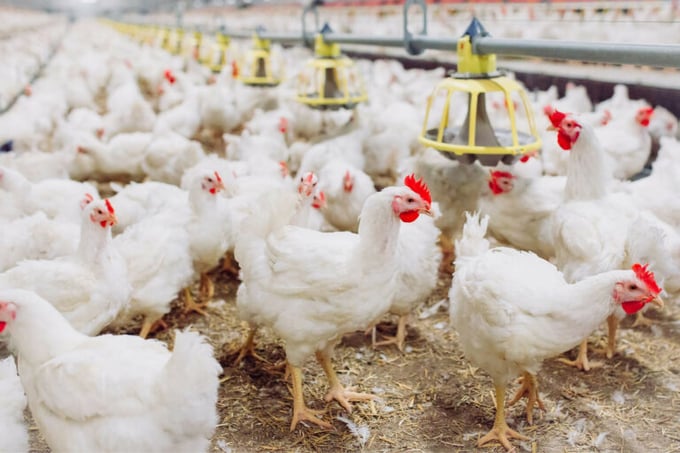November 25, 2025 | 09:32 GMT +7
November 25, 2025 | 09:32 GMT +7
Hotline: 0913.378.918
November 25, 2025 | 09:32 GMT +7
Hotline: 0913.378.918

Black soldier fly larvae are known for their ability to promote natural poultry behaviour and are a nutrient-rich, high-quality protein source. Photo: Canva.
The ‘FeedFlow’ project is being led by insect farming innovator Flybox and is funded by Innovate UK as part of Defra’s Farming Innovation Programme.
Although the UK poultry industry has seen significant advancements in production sustainability through genetic selection, it faces persistent issues including poor leg health, high mortality rates and variable feed conversion rates, as well as contributing the ammonia emissions.
To address these issues and stay competitive against low-cost imports, UK poultry production systems need to evolve continuously. Black soldier fly larvae are renowned for their ability to promote natural poultry behaviour and are a nutrient-rich, high-quality protein source enhanced with antimicrobial peptides.
Artificial intelligence systems, meanwhile, propel precision agriculture by delivering real-time data on flock welfare and early warnings of potential issues. The FeedFlow project harnesses these technologies with a cutting edge rapid intervention system. It integrates FLOX360, an in-demand computer vision platform powered by enterprise-grade AI algorithms.
In addition, the project incorporates Life Cycle Analysis, which is being led by Jess Callagham from the University of Chester, to assess Global Warming Potential. Flybox is also working with Nottingham Trent University’s School of Animal, Rural and Environmental Sciences, which will look at how fortified BSF larvae could deliver a rapid nutrient boost that addresses health challenges more effectively than traditional feed interventions.
Emily Burton, a professor in sustainable food production at Nottingham Trent University, said: “Insects are an essential part of our transition from linear to circular resource use, and project like this are accelerating insect production to commercial viability by thinking outside the box about how we can harness them to improve poultry production.”
Last year, Flybox and Nottingham Trent University embarked on a study to feed black soldier fly larvae food waste – nutritionally-enhanced using nanometre sized natural minerals – before being added to poultry feed. The work is part of a feasibility study which aims to increase the nutritional value of chickens and significantly reduce the carbon footprint of ingredients.
(Poultryworld)

(VAN) Brazil's COP30 presidency pushed through a compromise climate deal on Saturday that would boost finance for poor nations coping with global warming but that omitted any mention of the fossil fuels driving it.

(VAN) Poultry farmers in the UK have been warned that they could face one of the worst winters yet for bird flu.

(VAN) Prices of main-crop paddy have risen sharply, with jasmine rice hitting 16,100 baht per tonne — the highest level in years.

(VAN) In Brazil, FAO unveiled a series of reports and initiatives showing how sustainable agrifood systems are a solution to the climate crisis.

(VAN) With names like neodymium and dysprosium, rare-earth elements sound exotic — and their perceived scarcity has only added to the mystique.

(VAN) In a new study published in Trends in Biotechnology, researchers used a gene-editing technology called CRISPR to increase a fungus's production efficiency and cut its production-related environmental impact by as much as 61%- all without adding any foreign DNA.

(VAN) A top official in Beijing’s Cop delegation says China is committed to clean energy – but US’s absence is a problem.